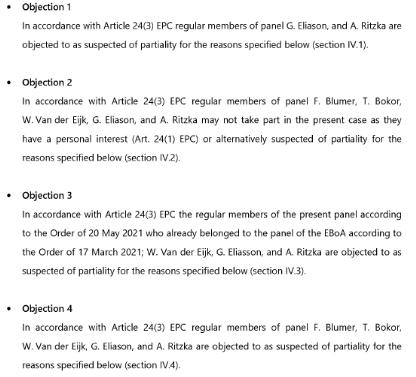
Latest news about G 1/21.
Summary: Breaking news from Europe's biggest anarchy
As is generally known by now, on Monday, 17 May 2021, an interlocutory decision of the EPO's Enlarged Board of Appeal was taken in case G 1/21.
"This latest submission from Isarpatent raises new partiality objections and requests a postponement of the oral hearing scheduled for 28 May 2021."This decision focused on partiality objections raised by the appellant, Rohde & Schwarz GmbH, and it resulted in two members of the original panel being sidelined, namely the Chairman Carl Josefsson and a legal member, Ingo Beckedorf.
The interlocutory decision was communicated to the parties on Friday, 21 May, together with an order dated 20 May setting out the new composition of the panel. [PDF]
As previously reported, the new composition of the panel is as follows:
Chairman: Fritz Blumer (CH)
Legally qualified member: Wim van der Eijk (NL) – designated as Rapporteur
Legally qualified member: Tamás Bokor (HU)
Legally qualified member: Richard Arnold (GB)
Legally qualified member: Evangelos Chatzikos (GR)
Technically qualified member: Gunnar Eliasson (SE)
Technically qualified member: Andrea Ritzka (DE)
The following Monday, 24 May, the appellant Rohde & Schwarz GmbH - represented by
Isarpatent Patent- und Rechtsanwälte - threw another spanner in the works with
a detailed 23-page submission.
[PDF]
This latest submission from Isarpatent raises new partiality objections and requests a postponement of the oral hearing scheduled for 28 May 2021.
According to Isarpatent, the change of the composition of the Enlarged Board, and the interlocutory decision of 17 May give rise to new objections concerning the composition of the panel.

New objections raised by Isarpatent in case no. G 1/21.
The submission notes that the present referral relates to "an important legal question, relevant for the future form of oral proceedings, with an exceptionally broad user interest" and that it demands to be "handled with the utmost care and diligence".
However, the EBA opened the proceedings with several orders dated March 17, 2021 and - on the same day - issued summons to oral proceedings scheduled on May 28, 2021. This was just in time to fulfil the minimum two months' notice of the summons stipulated in Rule 115(1) EPC.
The Enlarged Board's manner of proceeding in this case is in stark contrast to the practice in examination and opposition proceedings, where the summons is issued at least four (examination) to six (opposition) months ahead of the day appointed for the oral proceedings.
According to Isarpatent:
The precipitate way in which the Enlarged Board of Appeal handles this important case, which concerns fundamental rights according to Art. 116 EPC, puts the parties of the proceedings, third parties according to Article 10 of the Rules of Procedure of the Enlarged Board of Appeal (RPEBA), and finally the members of the EBoA under unnecessary pressure in view of the complex legal issues to be discussed.
Isarpatent further notes that the interlocutory decision of 17 May has resulted in a substantial reshuffle of the panel
a mere five working days before the scheduled oral proceedings and that this has
"put the new members under exceptional pressure as they now need to familiarize themselves with the case and discuss the matter with the further Board members within an extremely short period of time."
Accordingly, Isarpatent has requested a postponement of the oral hearing scheduled for 28 May 2021.
In addition to this, Isarpatent has made a whole host of further procedural requests, including a request for interlocutory oral proceedings to deal with its new partiality objections.
In this regard, Isarpatent has requested that Beckedorf be heard as a witness to clarify the roles of Eliasson and Ritzka in the procedure which led to the adoption of the disputed video-conferencing regulation.
They also request the Enlarged Board to provide the parties with copies of the submissions of Beckedorf, Eliasson and Ritzka which are mentioned in the interlocutory decision and to provide information about the members of the
"Working group on VICO provision in RPBA", an advisory body which was set up by Josefsson and in which Eliasson and Ritzka are suspected of having participated.
Isarpatent also claims that the selection of Blumer and Bokor as the replacements for Josefsson and Beckedorf was not in conformity with the applicable Rules of Procedure and has requested their replacement
"pursuant to Art. 2(1)(b) of the Business Distribution scheme of the Enlarged Board of Appeal".
What is particularly interesting is that on page 21 and 22 of the submission, Isarpatent draws attention to the
invisible influence which Josefsson can still exert over the proceedings from behind the scenes.
As already pointed our in the postscriptum to the recent series,
Rule 12d(3) of the EPC, introduced by
Benoît Battistelli's 2016 "reform", makes
all internal members of the Enlarged Board dependent upon Josefsson's goodwill for the purpose of obtaining a positive "opinion" on their reappointment.
This effectively means that all internal members of the reconstituted panel are still beholden to Josefsson despite the fact that he has been officially sidelined from case no. G€ 1/21.
Isarpatent has now had the temerity to point an incriminating finger at this "elephant in the room", and it remains to be seen how the Enlarged Board will react.
All things considered, Isarpatent's submission puts the Enlarged Board in a very difficult situation.
If they choose to take the submission seriously, it's difficult to see how the proceedings scheduled for 28 May 2021 can go ahead as planned.
If they don't, then it's likely to enhance the perception of a "kangaroo court" and confirm suspicions that Josefsson's sidelining on 17 May might just have been a tactical manoeuvre for the sake of "optics".
Watch this space for further updates…
⬆

